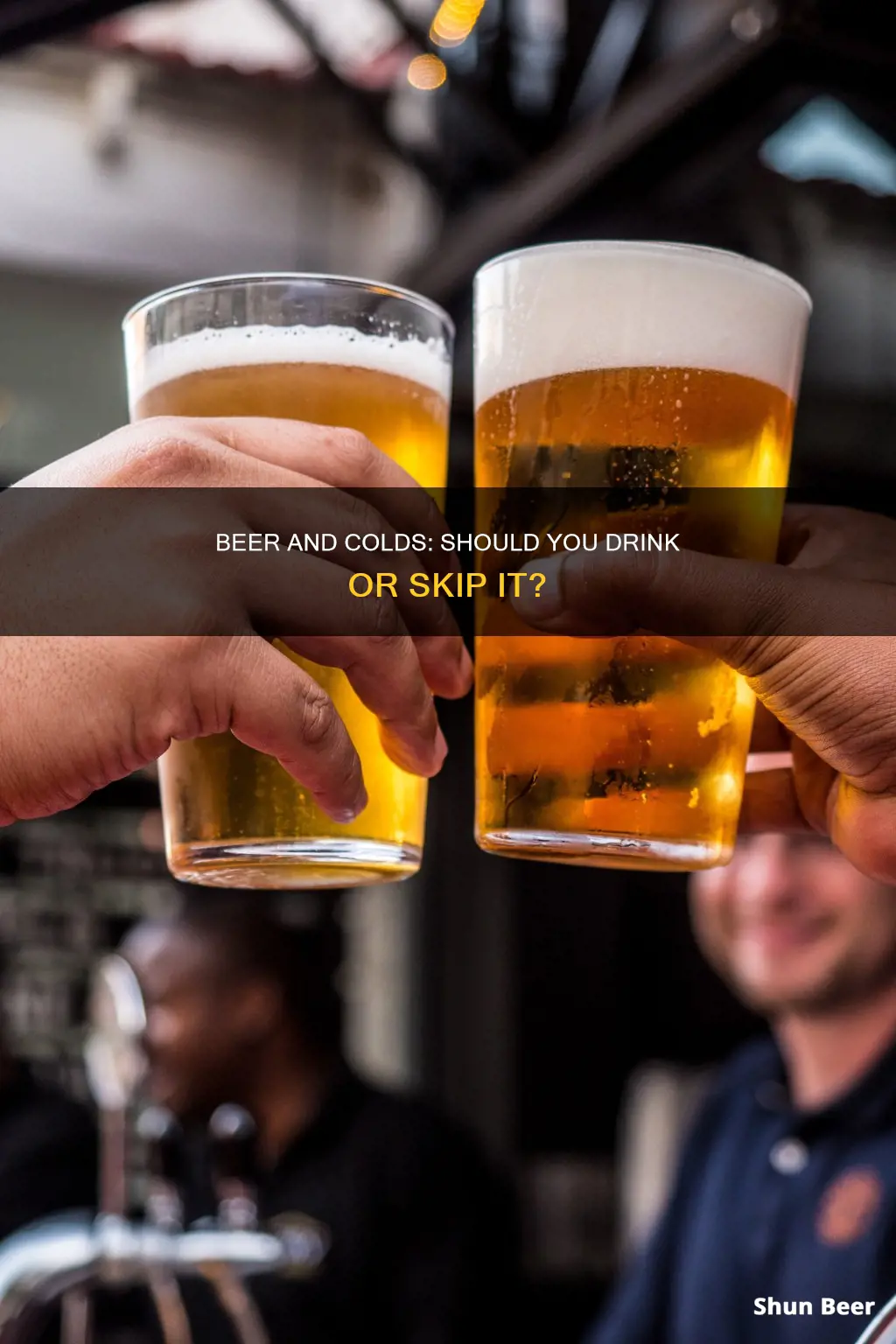
Drinking alcohol when you're sick is generally not recommended by health professionals. Alcohol can weaken your body's ability to fight off infection and slow down your recovery. It can also cause dehydration, which can worsen congestion. In addition, alcohol can interact with certain cold medications and make them less effective or even dangerous. However, some studies suggest that moderate alcohol consumption may decrease the number of colds people get overall. For example, a 2012 study found that participants who drank 1 to 2.5 drinks per day experienced fewer episodes of the common cold compared to those who did not drink at all. Nevertheless, excessive alcohol consumption is harmful to health and can increase the risk of infection.
| Characteristics | Values |
|---|---|
| Can drinking beer help with a cold? | There is limited evidence that drinking a small amount of alcohol may reduce the number of colds people get per year. However, there is no cure for the common cold. |
| Can alcohol treat a cold? | No, alcohol cannot treat or cure the common cold. |
| Can alcohol help prevent colds? | There is limited evidence that moderate consumption of alcohol may help reduce the frequency of colds. |
| Negative effects of drinking alcohol when sick | Alcohol can weaken the body's ability to fight off infection and slow down recovery. It can also cause dehydration and interrupt sleep. Alcohol can also negatively interact with cold medication. |
| Health authority recommendations | Health authorities generally do not recommend drinking alcohol during a cold. The CDC also advises people who do not currently drink to avoid starting for any reason. |
What You'll Learn

Beer won't cure your cold
While some sources claim that beer can help fight off a cold, the amount of beer you would need to drink to reap the benefits far outweighs any positive effects. A study from Sapporo Medical University in Japan found that the chemical humulone, found in hops, can curb the respiratory syncytial virus (RSV), which causes cold-like symptoms in adults. However, to ingest enough humulone to unlock beer's anti-viral power, you would need to drink around 30 cans of beer. As such, beer is not a practical solution for curing your cold.
Drinking alcohol when you are sick can actually prolong your recovery process. Alcohol weakens your body's ability to fight off infection and can make your body more susceptible to illness. It can also disrupt your sleep, which is crucial for recovering from sickness. Alcohol interrupts REM sleep, the most restorative type of sleep, and can leave you feeling grogy and tired.
In addition, many common cold and flu symptoms overlap with those of a hangover. Even drinking a moderate amount of alcohol can worsen these symptoms, including headaches, body aches, nausea, and fatigue. Alcohol can also cause dehydration, which can make congestion worse.
Finally, it is important to consider the interaction between alcohol and cold medications. Alcohol can negatively interact with certain over-the-counter and prescription medications, making the combination dangerous. For example, acetaminophen, a common pain reliever and fever reducer found in many cold and flu medications, can cause liver damage when combined with alcohol. Therefore, it is generally recommended to avoid drinking alcohol when you are sick and to opt for hydrating beverages instead.
Beer Razzles: How Do They Work?
You may want to see also

Alcohol weakens your immune system
Drinking alcohol weakens your immune system, making your body more susceptible to infections and slowing down recovery. According to the National Institute of Alcohol Abuse and Alcoholism (NIAAA), even a single episode of binge drinking can increase your risk of infection for up to 24 hours.
Alcohol has a detrimental impact on the gut microbiome, which is home to trillions of microorganisms that play crucial roles in maintaining health. It affects the ability of these microorganisms to support the immune system. Additionally, alcohol may damage the immune cells lining the intestines, which act as the first line of defence against bacteria and viruses. By impairing these cells, alcohol makes it easier for pathogens to enter the bloodstream.
The NIAAA also highlights that alcohol consumption can damage the protective lining of the respiratory tract, which is essential for preventing upper respiratory tract infections like the common cold. Excessive alcohol consumption is linked to an increased risk of pneumonia and other pulmonary diseases.
Moderate alcohol consumption, defined as one drink per day for women and up to two drinks per day for men, may not significantly affect the immune system. However, it is important to note that certain individuals, such as those with chronic liver conditions or pregnant women, should avoid alcohol altogether.
In summary, alcohol weakens the immune system by impairing the body's ability to defend against pathogens and increasing the risk of infections, including the common cold. It is advisable to refrain from excessive alcohol consumption, especially when sick, to maintain a strong immune system and promote recovery.
Beer and Diabetes: Is It Safe to Drink?
You may want to see also

Alcohol can worsen your cold symptoms
While there is limited evidence that drinking a small amount of alcohol may reduce the number of colds you get per year, excessive alcohol consumption is highly damaging to human health and increases the risk of infection. It is also important to note that alcohol cannot treat or cure a cold. Health authorities generally advise against drinking alcohol during a cold.
Alcohol weakens your immune system
Alcohol weakens your body's ability to fight off infection, making your body more susceptible to getting sick and slowing down recovery. According to older research, long-term alcohol use can make a person 3-7 times more susceptible to viral and bacterial infections, including colds.
Alcohol interrupts your sleep
Getting enough sleep is important for recovery. Alcohol may help you fall asleep, but it disrupts REM sleep, the most restorative type of sleep, which can leave you feeling groggy in the morning. It also turns on a sleep pattern called alpha activity, which prevents your body from getting the deep sleep it needs. Not getting enough sleep can make your cold or flu symptoms worse and prolong your recovery.
Alcohol worsens common cold and flu symptoms
Many common cold and flu symptoms are also symptoms of a hangover. Even drinking a moderate amount of alcohol can worsen these symptoms, including:
- Headaches and body aches
- Nausea, vomiting, or stomach pain
- Fatigue and weakness
Alcohol causes dehydration
According to Dr. Segal, "we risk becoming increasingly dehydrated when we consume alcohol, and being dehydrated can make congestion worse."
Alcohol interacts with cold medication
Alcohol can interact with some over-the-counter and prescription medications. For example, acetaminophen, a common pain reliever and fever reducer found in many cold and flu medications, is metabolized in the liver, as is alcohol. Drinking while taking this medication can cause liver damage.
Magnesium and Beer: Safe Combo or Health Risk?
You may want to see also

Alcohol can cause dehydration
Drinking alcohol can lead to dehydration, a condition that occurs when the body does not have enough fluids to function effectively. Alcohol is a diuretic, which means it causes the body to remove fluids more quickly than other liquids. This can result in a person becoming dehydrated if they don't drink enough water along with their alcoholic beverage.
How Alcohol Causes Dehydration
When a person consumes alcohol, both the liquid and alcohol content pass through the stomach lining and small intestine into the bloodstream. On an empty stomach, alcohol can enter the bloodstream within minutes. Once in the bloodstream, alcohol can travel anywhere in the body, including the brain, which is why judgement and coordination become impaired when intoxicated.
Additionally, alcohol suppresses the release of the antidiuretic hormone vasopressin, which normally acts to reduce urine production by causing the kidneys to reabsorb and retain water. By inhibiting vasopressin, alcohol increases urine output and contributes to dehydration.
Preventing and Counteracting Dehydration
To prevent dehydration, it is recommended to drink alcohol in moderation, slowly, and alongside water or other hydrating beverages. Eating food while drinking alcohol can also help slow the absorption of alcohol and reduce the risk of dehydration.
If dehydration occurs, it is important to rehydrate by consuming water or electrolyte-fortified sports drinks. Eating protein-rich and vitamin-dense foods can also help reduce the discomfort associated with dehydration and hangovers.
Other Health Risks of Alcohol Consumption
In addition to causing dehydration, alcohol consumption carries other health risks. Alcohol can irritate the gastrointestinal tract, causing inflammation and discomfort. It can also alter the balance of the microbiome, leading to bloating and gut inflammation.
Alcohol's impact on sleep is another important consideration. It disrupts REM sleep, the most restorative type of sleep, leaving individuals feeling groggy and tired the next day.
Chronic heavy drinking can lead to high blood pressure, kidney disease, a weakened immune system, vitamin deficiencies, gastrointestinal problems, cardiovascular complications, and an increased risk of certain types of cancer.
Therefore, it is important to drink alcohol in moderation and to be aware of the signs and symptoms of dehydration and alcohol-related health issues.
Beer and Afib: What You Need to Know
You may want to see also

Alcohol may interact with cold medication
Alcohol may have harmful interactions with cold medication. The National Institute on Alcohol Abuse and Alcoholism (NIAAA) states that mixing alcohol with cold medicines can intensify sedating effects and make it unsafe to perform certain tasks, such as driving. It may also increase the risk of falls and serious injuries, especially in older people.
Acetaminophen, a common pain reliever and fever reducer found in many over-the-counter cold and flu medications, should not be mixed with alcohol as both are metabolized in the liver, and the combination can cause liver damage. Chlorpheniramine maleate, an antihistamine that relieves symptoms like sneezing, a runny nose, and itchy eyes, should also be avoided as alcohol can worsen side effects such as drowsiness or nausea.
Pseudoephedrine and phenylephrine, common nasal decongestants, can negatively interact with alcohol, causing difficulty sleeping and headaches. The sedating effects of allergy, cold, and flu medications can be increased by alcohol, leading to slowed or impaired breathing, impaired motor control, abnormal behaviour, memory loss, and fainting.
Women and elderly individuals are at greater risk of adverse medication interactions when mixing alcohol with these medications. Women tend to have less water in their bodies than men, and as alcohol mixes with water throughout the body, the proportion of alcohol in a woman's bloodstream will be relatively higher. Elderly individuals take more time to break down and process alcohol, meaning it remains in the body for longer, increasing the chance of adverse medication interactions.
Beer Overload: Sore Throat Culprit?
You may want to see also
Frequently asked questions
It is not recommended to drink beer or any other alcoholic beverage when you have a cold. Alcohol weakens your body's ability to fight off infection and can slow down your recovery.
Alcohol has a negative effect on your immune system, interrupting your sleep, and causing dehydration, which can make congestion worse.
There is limited evidence that drinking a small amount of alcohol may reduce the number of colds you get per year. However, excessive alcohol consumption is highly damaging to human health and increases the risk of infection.
It is recommended that you get enough rest, drink plenty of fluids, and take over-the-counter medications such as decongestants, cough medication, and pain relievers.
No, alcohol can interact with some over-the-counter and prescription medications and can be dangerous. For example, acetaminophen, a common pain reliever and fever reducer can cause liver damage when mixed with alcohol.







